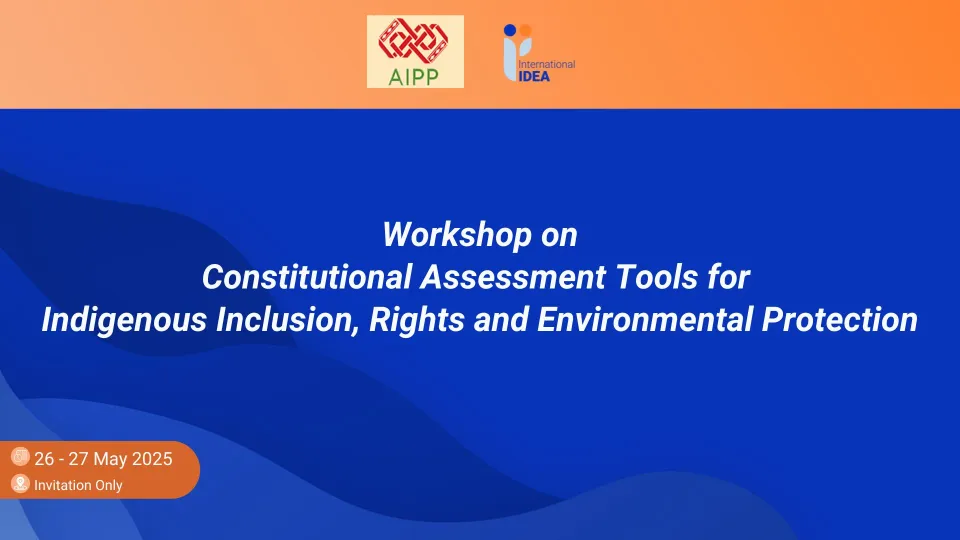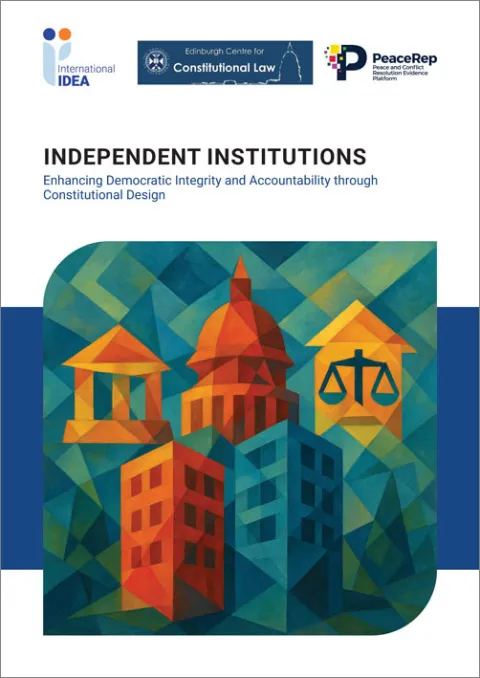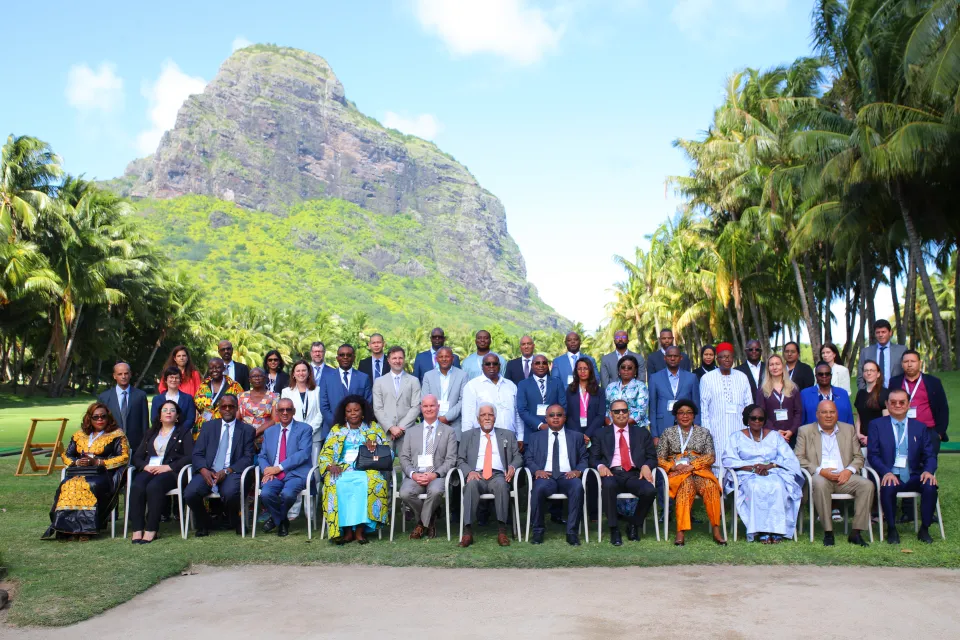Search
Region
Country
Type
Sweden, represented by Mr Robert Rydberg, State Secretary for Foreign Affairs, and Ambassador Niklas Kebbon, Head of Department for International Law, Human Rights and Treaty Law, handed over the Chairship of International IDEA to the Australian Ambassador to Sweden, Mr Bernard Philip, at the Council of Member States meeting held on 1 December 2020.
On Friday 11 December, the Ministry of Foreign Affairs of Mongolia and International IDEA co-organized a webinar to present the findings of International IDEA’s report The Global State of Democracy 2019: Addressing the Ills, Reviving the Promise in Mongolia.
Electoral campaigns are central to influencing how people vote and can also affect people’s perception of the legitimacy of a country’s elections and democracy in general.
Today, political parties and other stakeholders are increasingly using new online techniques in electoral campaigns. Many countries struggle with applying regulatory frameworks on elections to the online sphere, especially as regards online political advertising and microtargeting.
GUEST PODCAST: The Votes and Ballots podcast interviewed Erik Asplund, International IDEA's Electoral Processes programmer officer about Elections and COVID-19. This external podcast is only available on the Votes and Ballots Soundcloud platform.
Para entender la situación actual del COVID-19 en América Latina y su impacto en las democracias de la región, le invitamos a seguir cada lunes a las 12:00 pm (CDT), en Aristegui Noticias, las mesas de discusión 2020: La Pandemia, coordinadas por Daniel Zovatto, Director Regional para América Latina y el Caribe de IDEA Internacional.
El jueves 10 de diciembre, la Fundación Unión Europea-América Latina y el Caribe e IDEA Internacional firmaron un acuerdo marco de cooperación entre los dos organismos, con el interés de aunar sus esfuerzos e implementar un amplio abanico de actividades para cumplir sus objetivos institucionales: buscar una cooperación interregional entre Europa y América Latina, en pos de la democracia, los derechos humanos, la sustentabilidad, el Estado de Derecho y la inclusión social y de género.
"Illiberal democracy", Viktor Orban has told us, is the new wave of democracy. He is in some ways, unfortunately, right. We in the democracy field have been extremely clumsy in responding to this trend. We discuss "backsliding democracies" and "democratic decline", send off worried cables and press releases with a furrowed brow. But what we really are referring to is the rise of illiberalism. Democracy is embraced—elections are held in which the majority determines the outcome.
In 2015, the new Constitution of Nepal established a federal system of governance consisting of three spheres of governments —Federal, Provincial (Pradesh, 7) and Local (Palika, 753)— that exercise the state powers within the ambit of the Constitution and other laws.
This GSoD In Focus provides a brief overview of the global state of democracy at the end of 2019, prior to the outbreak of the pandemic, and assesses some of the preliminary impacts that the pandemic has had on democracy globally in 2020.
Key findings include:
Indonesia’s Head of Region elections (Pilkada) involving a little more than 100 million voters to elect 9 provincial governors, 37 mayors and 224 heads of regency (Bupati) are simultaneously held today. This is the largest one-day election held during the COVID-19 pandemic eclipsing the US General Elections, which, although larger in the number of voters, were held in more than one day through early-voting facilities.
Many governments are restricting information about COVID-19, clamping down on independent media and freedom of speech while polarisation and lack of political consensus have sparked unrest and distrust in elections and democratic processes.
El 1 de diciembre de 2020, la sesión del Consejo de Estados Miembros nombró a siete nuevos miembros para la Junta de Asesores por un período de tres años, desde 2021 hasta 2023.
IDEA Internacional se complace en dar la bienvenida a los nuevos miembros de la junta y espera trabajar estrechamente con ellos en los próximos años. A partir del 1 de enero de 2021, la Junta de Asesores de IDEA Internacional incluirá:
On 1 December 2020, the Council of Member States session appointed seven new Members to the Board of Advisers for three-year terms from 2021 to 2023.
“El que no vota no come” amenazó hace unos días Diosdado Cabello a la ciudadanía. Al número dos del régimen autoritario chavista le preocupa que ante la farsa electoral de este domingo, los venezolanos decidan no acudir a las urnas.
When constitutions are written in response to violent conflict or as part of a peace process, a key aim of constitution-building is to end the fighting and channel disputes through political institutions. Because of this, people at the negotiating table tend to be parties to the conflict, who are predominately men. When constitution-building responds to broad social unrest, in comparison, a key aim is to create a new social and political order.
Si los últimos procesos electorales en Venezuela han estado ya signados por la desconfianza, las elecciones pautadas para el 6 de diciembre, en las que se renovará íntegramente su Asamblea Nacional con un mandato de cinco años, han generado aún mayores cuestionamientos en su integridad.
If the most recent elections in Venezuela have already been marked by distrust, the election scheduled for 6 December, in which the entirety of its National Assembly will be renewed with a five-year term, has given rise to even more questions about its integrity.
The EU's European Democracy Action Plan and its upcoming Digital Services Act aim to regulate online political advertisements.
مكنت الاصلاحات الانتخابية التي شهدتها عدة دول في المنطقة العربية منذ عام 2000، من إعادة النظر في الوظيفة التنظيمية للانتخابات للاجهزة الحكومية، خاصة منها وزارات الداخلية، وتشكيل هيئات أو مفوضيات مستقلة عن السلطة التنفيذية لتنظيم الانتخابات. ويأتي هذا الخيار إستجابة للمطالب الشعبية والتزاماً من الدول التي انتهجته بضرورة النأي بالمسار الانتخابي عن كل تدخل وتوفير الضمانات اللازمة لنزاهته. وقد شهدت المنطقة العربية أول موجة لتشكيل الهيئات والمفوضيات واللجان الانتخابية المستقلة عام 2000.


